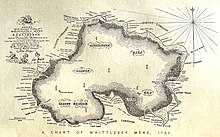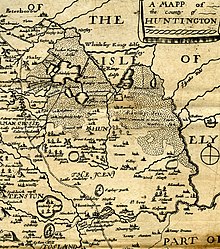

Whittlesea Mere was an area of open water in the Fenland area of the county of Huntingdonshire (now Cambridgeshire), England. The mere occupied the land southeast of Yaxley Fen, south of Farcet Fen and north of Holme Fen. The town of Whittlesey lay to the northeast.[1]
Whittlesea Mere was the last of the 'great meres' to be drained. The old course of the River Nene took it into the mere on one side and out on the other. The area covered by water was at least 1,870 acres (756 hectares) in summer, extending to 3,000 acres (1,214 ha) in winter. The mere was a source of fish, wildfowl, reed and sedge for local inhabitants, and also provided a setting for 'water picnics' for the region's nobility.
According to the traveller Celia Fiennes, who saw it in 1697, the mere was "3 mile broad and six mile long. In the midst is a little island where a great store of Wildfowle breed.... The ground is all wett and marshy but there are severall little Channells runs into it which by boats people go up to this place; when you enter the mouth of the Mer it looks formidable and its often very dangerous by reason of sudden winds that will rise like Hurricanes...."[2]

- ^ "Streetmap.co.uk- search results for 522500,290500". www.streetmap.co.uk. Archived from the original on 24 May 2011.
- ^ The Journeys of Celia Fiennes. Edited and introduced by Christopher Morris (London: The Cresset Press, 1949), p. 67.